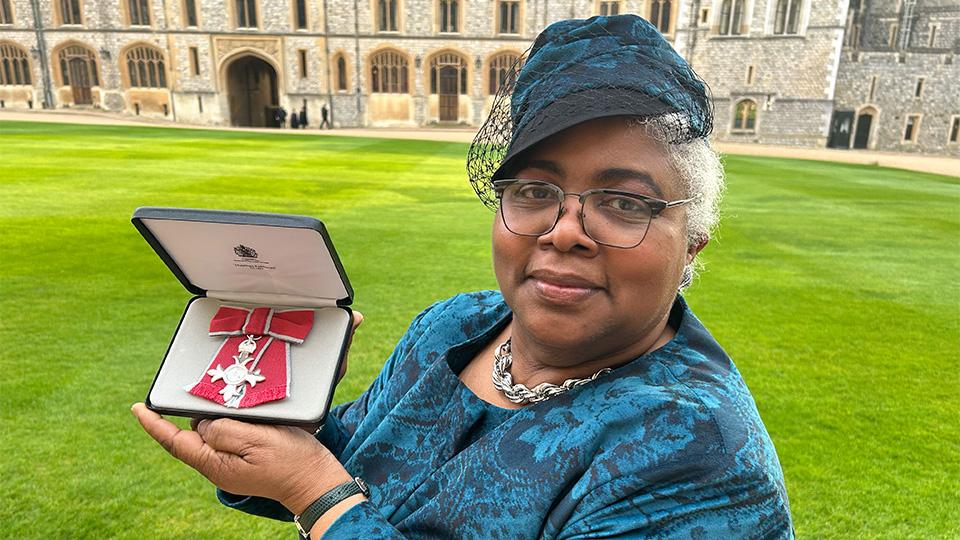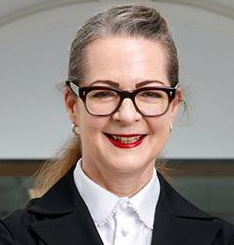Rose Sinclair awarded MBE in New Year Honours
Primary page content
Rose Sinclair has been awarded an MBE in the New Year Honours list for her work as a textiles researcher, curator and academic in textiles and design.

Rose Sinclair was officially awarded an MBE for services to the Arts at Windsor Castle on Wednesday 6 March, 2024 by Anne, Princess Royal.
Speaking of her investiture experience, Rose said: "This work stands on the shoulders of the women such as my mum, and others like her and those whose work still sits on the margins. It is also about me here now as an academic, it affirms my work and my role as a researcher, curator and practitioner with a passion for textiles who still believes that art and textiles can change the world.
"I loved the experience of collecting the MBE and will treasure this day for years to come."
Princess Royal, Anne talked with Rose about her work and women of the Windrush generation, and the value of textiles as a process to support women to gain a living.
Rose Sinclair’s work has been critical in championing and making more visible the design practices of Caribbean women that have been overlooked.
A senior lecturer in the department of design, the MBE award also recognises Ms Sinclair’s achievements in taking discussion on design and craft beyond academia by mounting community workshops across the country.
The MBE marks a 30-year period where Rose began collecting and researching black women’s crafts culminating in the major exhibition of Althea McNeish – a Caribbean born designer whose work reshaped UK homes but whose contribution was little known.
Born in London, Rose lived in Handsworth, Birmingham completing an Art and Design BTEC at Sutton Coalfield College before going on to do a BSc in Textiles at Huddersfield Polytechnic. She worked as a yarn designer for Coats Viyella and later retrained as a secondary school teacher becoming an early exponent of emerging use of computers in textiles design.
Rose joined Goldsmiths in 1998 on a research fellowship after gaining an MA in Textiles from Central St Martins.
The driver for her research into black Caribbean women’s crafting came from an embroidered picture made by her grandmother marking her wedding. At the time, Sinclair's teaching concentrated on the origins of craft practices, but the items from her relative remained on her mind:
I didn’t see our stories ... I didn’t see my grandmother's embroidery in any book or our crochet. I kept thinking, why we didn’t see it? African and American craft was spoken about, but where was Caribbean craft?
Rose Sinclair MBE
This omission led her to unearth the role of Dorcas clubs and the role they played in supporting and enabling crafting but also more widely.
Named after Dorcas – a woman in the bible known for her 'good works and acts of mercy sewing clothes for the poor' - clubs named after her taught the destitute to become 'makers of cloth'. Through missionaries the Dorcas tropes translated to the new world and were later conveyed in the re-passage of Caribbean immigrants arriving in the UK.
“The notion of Dorcas and charity gets built into black led churches,” Sinclair explained.
“With migration to Britain the women bring that with them and within that space they found a sense of how-to craft, to exchange knowledge, how to build social and spiritual networks. They also found a space where they could talk to each other about how to find a job, a house and how to decorate a space.”
Until Sinclair’s research this history of black women and their crafting culture was invisible, “We didn't know those stories of black women doing craft, but we are beginning to now”, she says.
Professor Frances Corner, Warden of Goldsmiths, is under no doubt about the importance of Rose’s work and its significance:
Rose Sinclair’s scholarship has made a unique contribution to design, broadening its perspective, and critically challenging its blind spots to acknowledge the craft and practice of African Caribbean women. Through Rose’s work, we are beginning to both cherish and preserve them as part of our national story.
Professor Frances Corner, Warden of Goldsmiths

“Rose has also been a pioneer in finding new ways of taking and sharing her work beyond academia. She has made involvement in textiles and design into a conversation with people and local communities across the UK.
“I can’t think of a recipient for the MBE more richly deserved or in recognition for services that were so vital.”
Ironically Sinclair thought her work was an unlikely candidate for the MBE;
“When the letter arrived it was in a white envelope with yellow writing that said Cabinet Office. And I said, “I don’t owe the tax man anything?” I thought I had done something wrong.”
Her work in resurfacing the craftivism of Caribbean women through Dorcas clubs that provided a supportive social and cultural network to newly arrived Caribbean immigrants leads Sinclair to think about her mother – a former nurse- who on her retirement dedicated 20 years of her life to volunteering for the NHS.
“I never imagined in a month of Sundays that somebody would nominate me for something like this. It just wasn’t on my radar.” I just followed in my mother’s footsteps, doing service to the community.
Rose's project to recreate a Caribbean front room in a Lewisham shopping centre